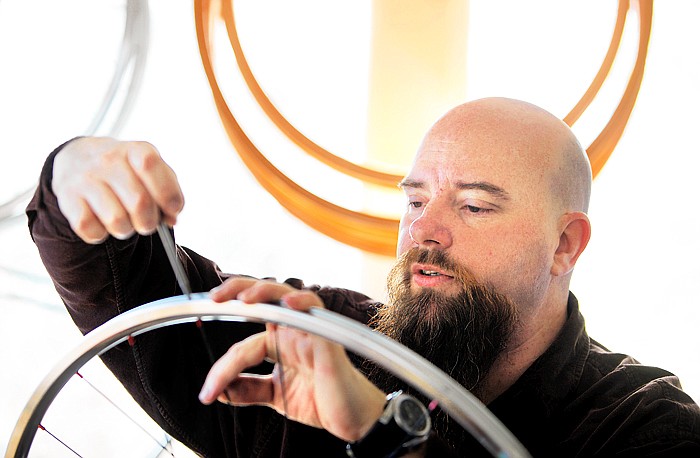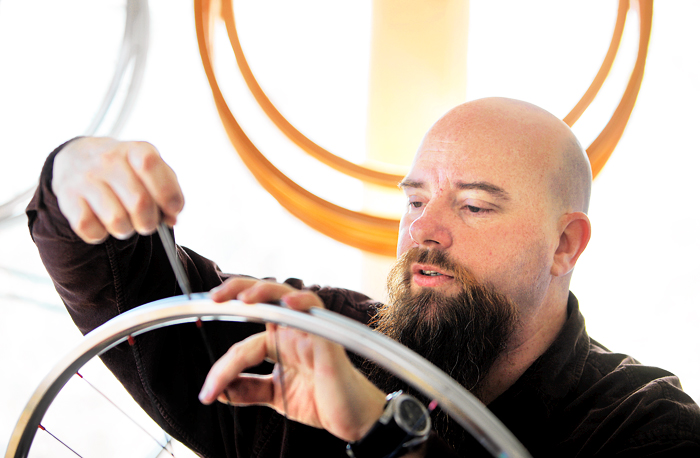From India and Rwanda to China and Argentina, Merlyn Townley has seen much of the world through the spokes of a bicycle wheel.
Townley is one of only a handful of Category 1-licensed bicycle race mechanics in the world, a distinction in the field that has afforded him the opportunity to work as a support mechanic in 60 counties on six continents during the last 20 years. He is also a practitioner of the art of building bicycle wheels by hand, a craft that is becoming rare.
After moving to Chattanooga in September 2009, Townley late last year launched Merlyn Mechanics, a custom bicycle wheel shop, repair station and maintenance school.
Q: Chattanooga is gaining a reputation as a bike town. Would you agree with that?
A: It is very much a bike town. I find that there are a lot of cyclists and a lot of really good cyclists here. It's a great scene for that. There's a lot of great riding here, both road and mountain.
There is getting to be more cyclo-cross racing going on. Without much effort, there could be more 'cross racing here than there is in New England, and New England has dominated that sport for 30 years.
Q: What does a bicycle race mechanic do for the cyclist?
A: Mainly, I'm known for neutral support, which means I will work for everyone, whether they are on a team or are an individual. (Mechanics) have 30 wheels and four or five bikes on the roof (of the car). If someone gets a flat, they move to the back and put a hand out. The mechanic pulls in behind them, gets out and puts a new wheel in very quickly. What is entailed in being a race mechanic is a mind-boggling amount of work.
Q: How quickly can you change a wheel?
A: I can do a consistent rear-wheel change in seven seconds. Front wheels, ironically, take a lot longer, depending on equipment challenges.
Q: Describe one of the worst crashes you've seen.
A: There were 130 riders going down the road in a circuit race in Massachusetts. One guy on the left decides he wants to be on the other side of the peloton (the main riding group). Instead of going up and around or back and around, he goes right through the middle as if no one was there. He took out 70 riders at once, and he was in a coma for five days. I personally did 28 wheel changes and four bike changes for that one crash. It was just pure, unadulterated chaos.
Q: What was the most common mechanical problem during a race?
ABOUT HIMAge: 46Family: wife, Heather HustonEducation: B.A. in industrial design and landscape architecture from the Rhode Island School of DesignHometown: Bristol, R.I.Hobbies: Volunteering with the Red Cross and amateur photographyPersonal hero: Orville and Wilbur Wright and Willy WonkaFavorite musicians: Igor Stravinsky, Daft Punk, Paul Oakenfold, MGMT and The Dead KennedysPlace he'd like to return to: PeruPlace he'd like to go: New ZealandFavorite book: "Dune" by Frank HerbertDream celebrity meeting: Benjamin Franklin
A:Flats, usually rear flats, unless it's raining, in which case it's front flats.
Q: What was one of your favorite races to work?
A: The most extraordinary cycling event I've done of any kind was in South Africa. It was called Cape Epic, and it was very aptly named. The people who put that on put on such a grand event they couldn't possibly have known anything about cycling before they got into it. There were 600 teams of two riders each. It was absolutely spectacular. That was in February or March of 2009.
Q: What was it like working the Odyssey 2000 around-the-world tour?
A:You'd be hard-pressed to do another tour like that. I can't imagine anyone doing another one with so many riders and so few mechanics. It started Jan. 1, 2000, and ended Dec. 31, 2000. In that time, we did 46 countries on six continents - 20,000 miles of riding. Sixty percent of it was camping, so 260 days of camping. My sleep was worth a lot to me, considering I was one of two mechanics for 250 riders. It was a logistical nightmare, an absolute nightmare.
Q: Why is having a Category 1 license such an exclusive distinction?
A: The difference between a category 2 and a category 1 (of four possible license levels) is a significant amount of international experience. It's a huge undertaking to do races overseas - traveling all the time, flying and dealing with the language barrier thing.
Q: Do you have to speak all the languages fluently?
A: I speak ... little bits of lots of things. After a while, you get in the airport, and the first thing you're asking is, "How do you say 'Thank you?' How do you say 'Where is the bathroom?'" Then, you get to know those bits and pieces, and you'll inevitably get to a place where you have a driver, and you get to talking to them or have a translator, and you'll learn a little bit more. Then, you'll leave for two years, forget it all until you come back.
Q: How did you start building custom wheels?
A: Jay Downing (in Providence, R.I.) taught me to build wheels. In those days (the late 1980s), every shop had a wheel builder. You would buy your rims and your hubs, and you would do your spoke calculations the old way -- with math instead of using some computer program. The math is mind-bogglingly complicated, so sometimes, it didn't work out so well. (Laughs.)
Q: What motivates you to keep making wheels that way?
A: I just refuse to let that kind of knowledge go. I think it's important, as part of our history, if nothing else. Also, I can build things machines can't build and do ... often, such as putting a twist or a half-twist in spokes on one side of a wheel.
Q: What is the benefit to the cyclist of having a handmade wheel?
A: You get exactly what you want. I talked to a guy a few months ago who wanted a set of wheels for his touring bike, which he wanted to ride from London to Hong Kong. Once you leave Europe, even the roads across China leading to Hong Kong leave a lot to be desired. They are beyond rough.
I can build the kind of wheel that will last for that kind of thing; that's no problem. But nobody builds wheels like that with a machine; it's too much, and there's not much call for it.

